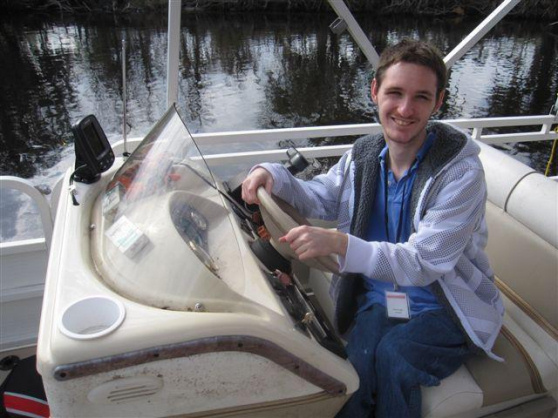GamesBeat: How have technological advances in the past five years — such as touchscreens and motion gaming — made it easier to be a gamer with disabilities?
Kingett: Touchscreens, and motion controls, and voice commands — those will be my downfall if they ever become the norm and replace controllers. If that happens, I fear I won’t be a gamer anymore. I find it extremely difficult to use all of the above — voice commands, touchscreens, and motion capture. In my opinion, they are the biggest accessibility barriers, but that’s just in my particular case. I can’t speak for other disabled people.
In my case, a controller [provides] precision. Touchpads don’t because sometimes I jerk and mess up and then die. With the DualShock, for example, my aiming is spot-on. I don’t know how I will be able to achieve such accuracy on a touch device. I’ve tried and was so bad at it that I should have been arrested by the video game police.
I can see where they would be a huge accessibility breakthrough, though, for paralyzed people who can speak — voice commands can manipulate gameplay. For me, they are the end of my gaming.
GamesBeat: Are some games easier for you to play than others? What are the biggest challenges or hindrances to you?
Kingett: Some games are easier because they have accidental accessibility features, as I call them, because I know bigger video game developers don’t think of disabled people first — if even at all — so accidental accessibility features make games easier, like GTA IV. That has audible GPS so I don’t have to flit my tunnel [vision] to the map and then the road.
On the flip side, there are games that require you to tap buttons rapidly that make it impossible — it just depends on how the game was designed. Difficulty modes help as well, and stark differences between the modes help. I always start off a game on easy and then work my way up. Beating Halo in legendary was epic, let me tell you!
GamesBeat: Can you explain a little more what you mean by “accidental accessibility features”?
Kingett: Accidental accessibility features, as I call them, are just that — accidental. They are small tweaks that accidentally make the games accessible when the developer wasn’t even thinking about accessibility at all.
GamesBeat: What is the one thing developers do with their games that drives you nuts – and how can they fix that problem?
Kingett: Oh my god, where do I begin? I hate it when developers make me go through scavenger hunts for objects that I may never be able to see at all. My fix? Have bigger objects or have them be a side quest or something.
Another is when tutorials are text-based — I don’t know what they say because the text rivals the size of an ant. I’d have an audio option in the options menu to have text automatically read aloud, even if it’s a synthetic voice.
Another is timed events. My solution? Don’t have them, or have an accessibility mode where disabled people can slow down the clock.
And lastly, when menus are in small text and there isn’t high contrast. I don’t understand why they do that at all. I just don’t understand it. I’d have a text size option. I’m sure on consoles it isn’t hard to do at all.
GamesBeat: What issues in the game industry are most important to you?
Kingett: I’d say a huge lack of awareness. There’s this big myth that disabled people don’t play games. Obviously, disabled gamers and disabled gaming organizations prove that myth is a lie, but there’s a huge lack of awareness. I also think they are too lax on bullying in the gaming sector. I don’t think they know how much hatred goes on in the lobbies. People report people, and they come back again. Don’t you think there should be harsher punishments? I certainly do.
 GamesBeat: Why are your perspective and the perspectives of other disabled people valuable to the larger discussion of games?
GamesBeat: Why are your perspective and the perspectives of other disabled people valuable to the larger discussion of games?
Kingett: Because our point of view helps to break down stereotypes and notions that disabled people can’t play video games. It’s a declarative statement that people will do what they really want to do even if they have to have a bit of adaptation.
My point of view — I look at my views as an information hub for everyone. Gamers can learn why a game won’t work for their disabled friend, developers can learn from my reviews on making games more accessible, disabled gamers can read my reviews to have a solid understanding of what to buy and what not to buy. I know how awful it is to buy something you can’t play, so I want to save others from that fate. Of course, on the other side of the coin, I want to tell disabled gamers what will be worth their time, effort, and money.
GamesBeat: What do you want people to learn or take away from your story?
Kingett: If anybody takes away something I’ve learned, either with or without a controller, then I have done my job as a gaymer. The world is a wonderfully unique place, and we all should slice and share our uniqueness with the rest. Life is like a restaurant. You can come into the environment with a set goal and know what you want to have, but it’s nice to stop and experience people or things that are around you.
I’m still playing, and that should be a lesson all on its own. If I’m playing, then you can play, too. Everyone can play, dominate, and level up — even if we have differences or live a certain kind of lifestyle. When we gamers connect through gameplay, we’re embracing our worldwide family. I hope that gamers don’t forget who they are — people who give power to the players.
VentureBeat's mission is to be a digital town square for technical decision-makers to gain knowledge about transformative enterprise technology and transact. Learn More


